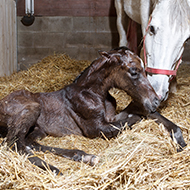
The disorder was previously thought to affect only warmblood horses
A new study has discovered the first case of Fragile Foal Syndrome (FFS) in a thoroughbred horse, a condition previously found only in warmblood horses.
The collaborative study was carried out by the Royal Veterinary College (RVC), the University of California Davis Veterinary Genetics Laboratory (VGL) and Rossdales Laboratories, Newmarket.
FFS is a connective tissue defect caused by a change in DNA within the procollagen-lysine, 2-oxoglutarate 5-dioxygenase1 (PLOD1) gene. It causes extensive skin lesions and musculoskeletal abnormalities, and the affected foals are aborted, stillborn or euthanised soon after birth owing to their condition.
As a autosomal recessive disorder, foals are affected if they have two copies of the mutation, so genetic testing is important for informing breeding decisions. This discovery is therefore particularly significant in highlighting the necessity of testing thoroughbred horses before breeding.
PhD student at the RVC, Jessica Roach, said: “Pregnancy loss, stillbirth and neonatal death remain an important source of reproductive losses for horse breeders worldwide.
"Over the course of my PhD we have collated a large biobank of tissue and data from late term pregnancy losses through the generous co-operation of UK and Ireland TB stud farms and Rossdales Laboratories, Newmarket.
“This has allowed us to explore the risk factors and pathology of many different causes of abortion and stillbirth. The collaboration with UC Davis and Lexi Grillos provided a fantastic opportunity to explore Fragile Foal Syndrome in our TB population and identify the first TB affected individual.
“Whilst clearly a distressing condition for affected foals and their owners, the good news is that this lethal syndrome can be avoided with testing and careful mating selection.”
The study is published in Equine Veterinary Journal, and is available online at beva.onlinelibrary.wiley.com.



 The Veterinary Medicines Directorate (VMD) is inviting applications from veterinary students to attend a one-week extramural studies (EMS) placement in July 2026.
The Veterinary Medicines Directorate (VMD) is inviting applications from veterinary students to attend a one-week extramural studies (EMS) placement in July 2026.